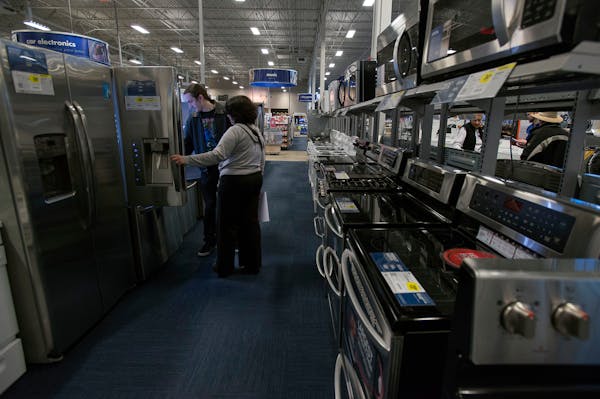Retailers are wasting no time this holiday season showcasing great deals, long before the Black Friday doorbusters.
Walmart.com offered a 42-inch JVC TV for $300 on Nov. 1. Banana Republic and Pottery Barn discounted virtually their entire non-clearance inventory 15 to 40 percent in October. And this week Target offered an unprecedented $200 credit on any used, functioning iPad with a new iPad purchase.
The early bargains are partly a reflection of the uncertain economy, as well as a compressed shopping season between this year's late Thanksgiving and Christmas. But they also show how retailers are working harder to get shoppers' attention in an age of intensifying online competition.
"Every year the promotions start earlier and get more sensational," said Sean Naughton, an analyst for Piper Jaffray in Minneapolis.
Some attribute the early specials to consumer sentiment sliding in October to its lowest since the end of last year, according to a University of Michigan survey.
Others point to reasons other than economics. Americans are procrastinating less, according to the National Retail Federation. About 22 percent of U.S. consumers say they start their holiday shopping in October, and the number who expect to finish their shopping in November is 5 percentage points higher than last year.
"Consumers don't need to play the waiting game anymore," said James Brown, vice president of sales at Pricegrabber.com. "If they see a great offer from the Gap or video game console, they should snap it up now instead of waiting until Black Friday."
One consequence of the emergence of low prices in early November could be to tarnish Black Friday's reputation as the best day for bargains. Brown said the variance between early November prices and Black Friday's deals is shrinking.
Early deals are one way for brick-and-mortar retailers to compete with online shopping, because consumers are more likely to take to the Internet when things get hectic. The Web was listed as the top destination for holiday shopping over discount retailers for the first time in 15 years, according to a survey by Deloitte.
But the same forces that have brought early deals could also force retailers to up their game on Black Friday itself. "We might see more enticing doorbusters to lure people into stores on Black Friday," said Lindsay Sakraida of DealNews.com.
A leaked Toys 'R' Us ad, for example, shows a Kindle HD Fire 8.9" tablet, for $179.99 ($229 on Amazon).
While the early bargains have been promising, shoppers shouldn't expect a repeat of the bonanza early in the recession. Retailers are much better at managing inventory now.
Best Buy, for example, has improved its inventory control and is making headway on the supply chain, said Peter Keith, a Piper Jaffray analyst. "There's not as much risk in electronics being overstocked after Christmas," he said. "TVs sell well until the Super Bowl."
Retailers that sell apparel and shoes run higher risks for overstocks and markdowns due to weather than a hard-line retailer such as Best Buy, Keith said.
Big-box stores can't turn on a dime when ordering for many items can occur four to six months in advance, said Brian Yarbrough of Edward Jones. "They can cancel some things and push back others, but they're ordering conservatively for the holidays," he said. "Retailers would rather give up sales than be caught with too much."
One thing shoppers and retailers may run out of is time. With a compressed window between Thanksgiving and Christmas, shoppers tend to spend a little less, said Naughton, the analyst at Piper Jaffray.
Besides time, expect Sony's new PlayStation 4 and Microsoft's Xbox One to be in short supply, regardless of whether they're a Black Friday doorbuster. They're guaranteed to create buzz with or without a sale, according to analysts.
John Ewoldt • 612-673-7633
